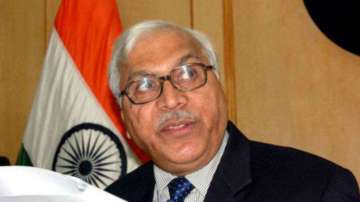Social media regulations needed to have fair elections: Poll experts
Political leaders and parties must get prior approval of the EC before posting anything on social media websites and they should also declare the expenditure incurred in using social media.

Social media should be included in the ambit of election rules related to print and electronic media and there should be proper regulation of their content by the Election Commission to ensure free and fair polls in the country, a group of poll experts and advocates said on Monday.
Addressing a press conference ahead of first phase of Lok Sabha election on April 11, former chief election commissioner S Y Quraishi said there cannot be a separate law for social media which should be treated as any other mass media.
He said political leaders and parties must get prior approval of the EC before posting anything on social media websites and they should also declare the expenditure incurred in using social media.
"Social media is also media. Whatever guidelines are meant for media- print and electronic- are applicable to social media websites also. There cannot be a separate law for it," said Quraishi, who was the CEC from July 2010 to June 2012.
Urging political parties to not "misuse social media or misguide voters by spreading fake news", Quraishi said, "Whatever you are spending on social media should be declared and the content to be posted on social media should also be approved by the Election Commission first.
"There is a committee to approve this - Media Certification and Monitoring Committee (MCMC) which will have social media expert also."
Echoing his views, senior advocate and Bar Council of Delhi chairperson K C Mittal said the country needs "uninfluenced fair electoral process" and there must be level playing field between parties and candidates as far as money power and media is concerned.
"This is why certain guidelines were issued earlier for print and electronic media so that genuine people are elected, " he said.
Mittal said social media platforms are wrong to say that "they are not responsible for the content being posted by users and it is their personal opinion".
He said that social media companies should be summoned by the EC and told that they will be held responsible for posting of any offensive material that influences the elections and will be prosecuted.
Concurring with Mittal, S K Mendiratta, former legal advisor to EC, said that ahead of Lok Sabha polls 2014, the poll panel came out with guidelines for social media wherein instructions were given to the candidates and political parties but the social media was not regulated.
"Today, big internet companies are sharing Indian data with the US intelligence agencies. Unless this is stopped, the EC cannot conduct free and fair polls because this sensitive data is being used to influence elections," he alleged.
Recently, social media giant Facebook said it has removed over 600 pages and fake accounts linked to individuals associated with an IT Cell of a political party.
Facebook, which has been facing flak globally for instances of user data breach, has been ramping up efforts to ensure that its platforms (that includes WhatsApp and Instagram) aren't misused to spread misinformation, especially ahead of polls in India.
It has recently started providing details of political ads on its platform in a bid to enhance transparency. According to a recent voluntary code of ethics prepared by such platforms, no political campaign will be allowed to run on them in the last 48 hours before polling ends.
The EC has also issued an advisory to media that exit polls can only be telecast on the evening of May 19 after the last phase of Lok Sabha election and has included websites and social media platforms for the first time.
The experts were, however, divided on the ongoing controversy over the recently launched 'Namo TV' channel against which the opposition parties have approached the EC demanding action.
While Quraishi and Mendiratta said that having a TV channel was not against the model code of conduct, senior advocate Mittal and High Court lawyer Virag Gupta said it could not be allowed.
"There are channels already running in south India. It is not against the model code of conduct. It is a normal publicity campaign material. But the content has to be monitored to ensure there is no incitement of any sort," the former CEC said.
His view was shared by Mendiratta who said, "There are channels like Jaya TV and others for publicity of parties in south India. This has been happening and it is part of their own publicity. They can do it."
However, Mittal claimed that it was against the model code of conduct.
"How can a political party or leader have their own channel for propaganda? Definitely EC can and should take action against such erring leaders. According to me you cannot have a channel. There may not be a cap on party expenditure, but again there will be no level playing field then," Mittal said.